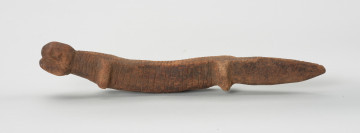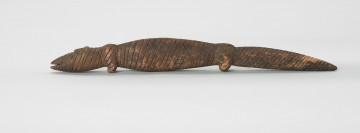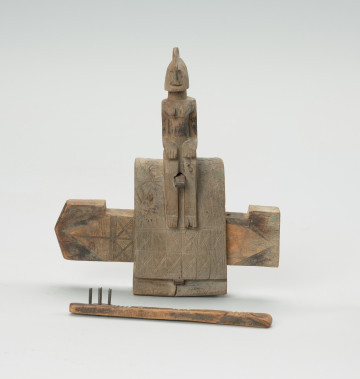
Zoomorphic figurine, figurine of crocodile
między 1951 — 2000
National Museum in Szczecin
Part of the collection: Collection of Dogonian art
The crocodile is called ayo geu in the Dogo-so language. It is one of the most important guardian animals of the Dogon people, whose cult is part of the Binu cult, dedicated to the first mythical ancestor Binu Seru, who came to Earth on an ark created by Amma, the creator of the universe. The unique relationship between human beings and the chosen animal has its origins in mythical and sometimes historical times, which have also been strewn with legends. One of them tells of the origin of the city of Bandiagara. It was founded by the hunter Nangabanou Yoroboque Tembely from the village of Gandakilema, near Sangha, who left his village to go hunting. He ventured far into the bush, but he did not hunt anything. He was thirsty, exhausted and disappointed. At one point, he spotted a crocodile and decided to hunt it down. He followed the crocodile to a stream where he could finally quench his thirst and regain his strength. He kept the crocodile alive because he was grateful to it for saving him. He decided to settle near the stream and always gave the crocodile some meat he hunted for protection. As late as the first half of the 20th century, crocodiles lived in the Bandiagara area and were widely respected. People would bring meat to visit them, and butchers also fed them. It was believed that the animals took care of the town and brought rain. Sometimes the reptiles attacked domestic animals, but people who provoked the crocodiles by disrespecting them and disturbing their peace were always blamed. Today, the most popular place where crocodiles live is Amani village. Feeding the animals living there was one of the tourist attractions even at the beginning of this century.
Ewa Prądzyńska
Author / creator
Dimensions
cały obiekt: height: 12,5 cm, width: 9,9 cm
Object type
figure
Creation time / dating
Creation / finding place
Identification number
Location / status

między 1951 — 2000
National Museum in Szczecin

między 1951 — 2000
National Museum in Szczecin

circa 1970
National Museum in Szczecin
DISCOVER this TOPIC
Museum of King Jan III's Palace at Wilanów
DISCOVER this PATH
Educational path